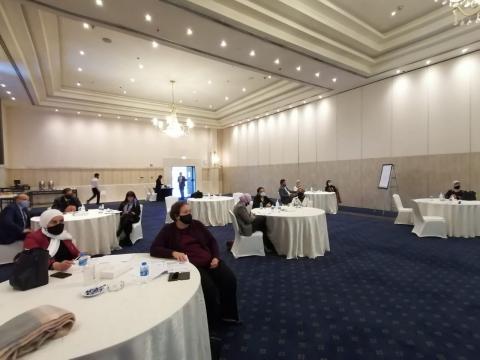

With support from UNFPA, HPC held on Wednesday a workshop to review national actions and priorities to fulfill global commitments made at the “Nairobi Summit ICPD +25 - Accelerating the Promise” in late 2019. The workshop was attended by representatives of concerned national institutions.
The aim of the workshop was to discuss the latest updates, national actions and priorities to achieve the Nairobi Summit commitments as well as national priorities to achieve the sustainable development goals. The workshop also sought to identify gaps and discuss the interventions and actions taken by the different national institutions that joined the Jordanian delegation at the summit.
HPC secretary general, Dr. Abla Amawi, said at the workshop that the Nairobi Summit aimed to mobilize political will and financial commitments to ensure the full implementation of the 1994 International Conference on Population and Development. Amawi added that the global commitments focus on specific issues pertaining to population and development, and particularly on the most vulnerable groups, and emphasizes the need to achieve transformative results, namely zero preventable maternal deaths; zero unmet need for contraception; and zero gender-based violence and harmful practices, such as child marriage and female genital mutilation.
Amawi pointed out that Jordan confirmed its commitment at the Summit, particularly its commitments to the ICPD Programme of Action as well as SDG priorities, and remains committed to providing quality and rights-based family planning information, advice and services especially in remote areas and to vulnerable groups. Amawi also stressed Jordan’s commitment to reduce maternal morbidity and mortality and ensure access for adolescents and youth to comprehensive and age-appropriate information by implementing the national youth-friendly SRH service standards and the National Youth Strategy (2019-2025).
Amawi added that Jordan has also confirmed its commitment to end gender-based violence by enforcing legislation that provides protection against violence, reduce child marriage, implement psychosocial and health strategies, programs and services, and continue to implement national policies, strategies and plans to invest in the demographic dividend.
Amawi highlighted several key challenges that face the achievement of development goals, including limited financial resources, political instability in the Arab region, youth population growth rates exceeding economic growth rates especially during Covid-19, decreasing job opportunities, weak SRH services to youth, persons with disabilities and refugees, and low economic participation rates by women,
Further, Amawi stressed the importance of inclusive and equitable reproductive health service delivery that focuses on adolescents, youth and persons with disabilities, promoting public-private partnerships, strengthening good governance, conducting regulatory reviews to increase the economic empowerment of women, achieve gender equality, and protect women against violence, investing in the demographic dividend, enhancing social protection policies, better targeting of the most vulnerable groups, and minimizing gaps and different economic conditions between different regions.
On the other hand, UNFPA Programs Director in Jordan, Bouchta Mourabit, provided an overview of UNFPA’s efforts to follow up on Jordan’s implementation of its commitments to the Nairobi Summit. Bouchta explained that a key area of intervention by UNFPA is the collaboration with the ministry of health, and other partners, to support the MSDR, provision of reproductive health services to Syrian refugees and other vulnerable groups in Jordan through the mobile reproductive health clinic and healthcare teams, promoting youth participation in the formulation of the national youth strategy, supporting the Youth Alliance for Safety and Protection, the provision of GBV prevention services at female-friendly centers. In addition, UNFPA collaborates and coordinates with the ministry of health and HPC to support the collection of demographic data and follow up on the implementation of the recommendations of the Demographic Opportunity Policy Document.
The workshop also reviewed and discussed interventions and actions taken by national institutions that joined the Jordanian delegation at the Nairobi Summit and discussed proposed recommendations to address challenges facing the implementation, as well as the next steps.







